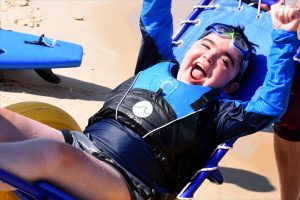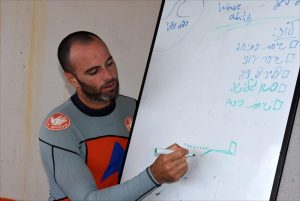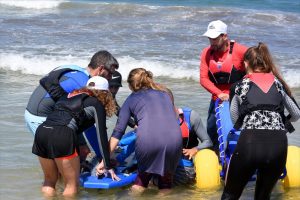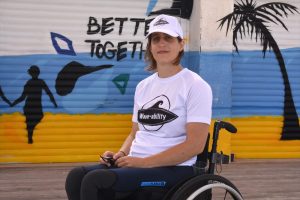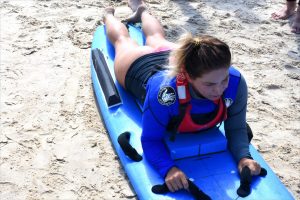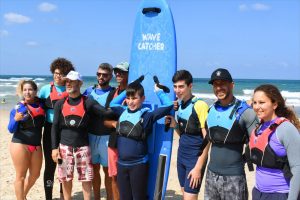Israel’s ‘Little Steps’ Helps Duchenne Boys Catch the Waves
Written by |
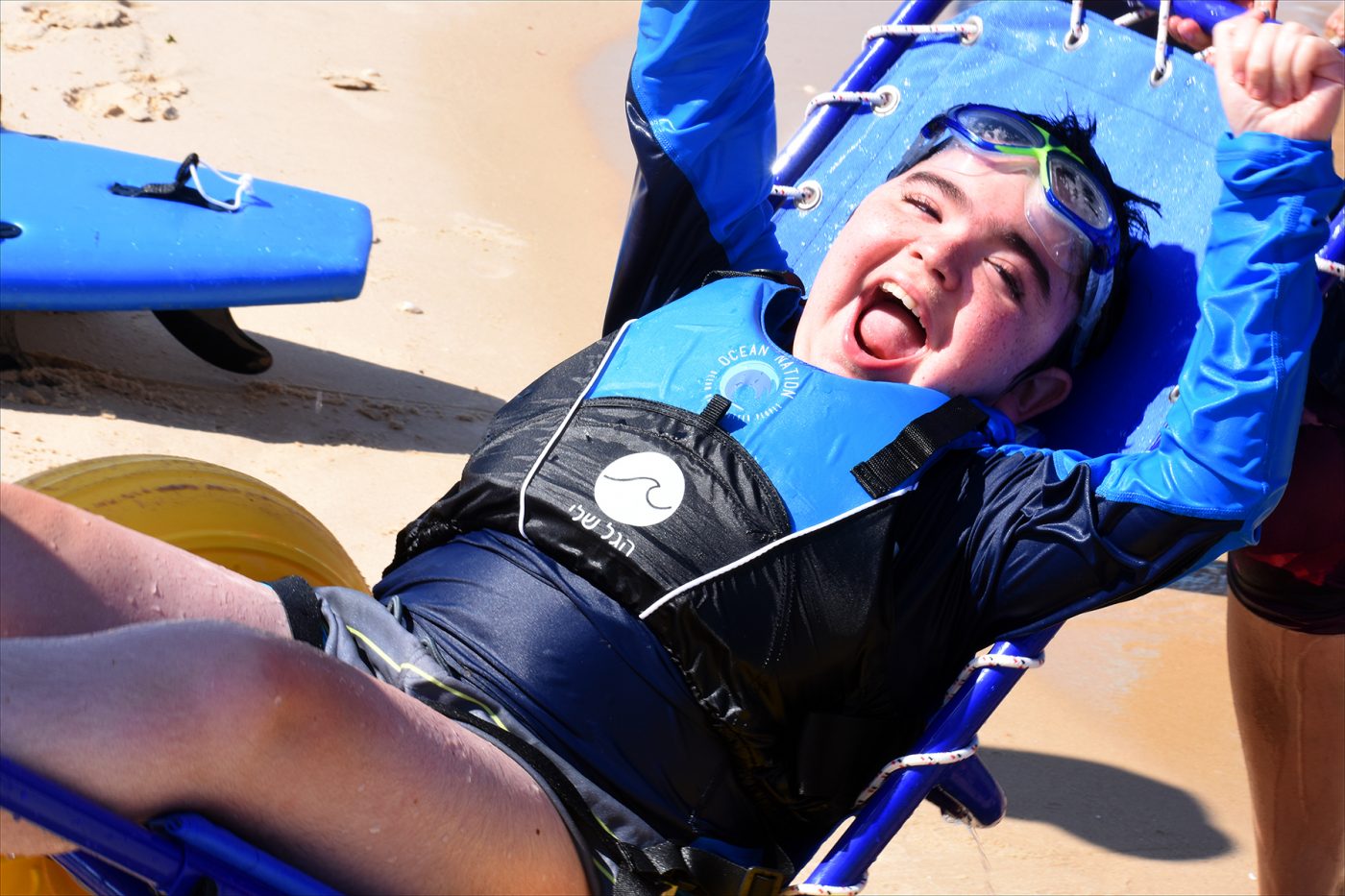
Adi Goldschmiedt, who has Duchenne muscular dystrophy, sports a huge smile after “catching a wave” off the coast of Bat Yam, south of Tel Aviv. (Photos by Larry Luxner)
On a recent summer morning off the coast of Bat Yam, south of Tel Aviv, a dozen Israeli volunteers in wetsuits splashed in the sparkling blue waters of the Mediterranean Sea.
But they weren’t there just for fun. The focus of their attention: three young boys gripping specially modified surfboards as they glided through the waves — and their parents watched nervously from the shore.
“He’s a very positive kid. I don’t know where he gets it from,” joked software engineer Shlomi Goldschmiedt as he saw his 12-year-old son, Adi, emerge from the surf with a huge smile on his face.
Adi and his two friends have Duchenne muscular dystrophy (DMD). They’re the pioneers in a brand new “adaptive surfing” project launched by Little Steps, an Israeli nonprofit dedicated to improving the lives of children with Duchenne and a less severe form of the disease known as Becker muscular dystrophy (BMD).
The innovative program has proven so successful, its organizers want to expand it next year.
“Boys with Duchenne cannot participate in regular camps or other summer activities like other boys. So it’s really important they have something fun they can do,” said Tali Kaplan, executive director of Little Steps and the mother of a 10-year-old boy, Ido, who has BMD. “Surfboarding teaches these boys balance and self-confidence. It’s also very cool to surf. Knowing you have this kind of activity for the whole summer means a lot to them.”
Little Steps (known in Hebrew as “Tza’adim Ktanim”) was founded in 2010 by Kaplan and her husband, Amit, along with several other couples including Goldschmiedt and his wife, Ziva.
The organization employs three people full-time, including research coordinator Mila Gumanovsky. About four years ago, it established a national registry — similar to the one operated in the United States by Parent Project Muscular Dystrophy (PPMD)— that contains a database of all known Duchenne and Becker patients in Israel.
Among other innovations, Little Steps pioneered the use of specially trained dogs to help boys with Duchenne. Muscular Dystrophy News Today wrote about that program in 2018.
Returning to the water
Israel, with 9 million inhabitants, is home to roughly 300 boys and young men with Duchenne.
“This is the first time this kind of adaptive surfing activity has ever been done in Israel for children with Duchenne,” said Kaplan, whose charity has an annual budget of 2.5 million shekels (about $700,000). “In fact, I haven’t seen anything like this for Duchenne anywhere.”
Little Steps is running the project in cooperation with another nonprofit, Wave-ability, which has its roots in tragedy.
Wave-ability’s founder, Inbal Reichler, was shot in the back during an Israeli Defense Forces combat training exercise when she was 18. The accident left the one-time surfer paralyzed from the waist down and in a wheelchair.
“Since my injury, I didn’t go to the beach. It was too difficult and dangerous, but I always had this dream to surf again,” Reichler, 36, said in a beachside interview. “Then, one year ago, I met people from an association that builds solutions for injured soldiers. I told them I wanted a surfboard, so they made me an adaptive surfboard that has handles to hold on to, and braces for the legs.”
But Reichler realized she wanted to do more, so she and four friends formed Wave-ability.
“The idea is to help other disabled people reach the beach,” she said. “We had an event in Tel Aviv last year, in September 2018, and were looking for disabled people to try surfing. Tali heard about our group, so we formed a partnership.”
The effort also involves another nonprofit. HaGal Sheli (Hebrew for “my wave”), a foundation for troubled teens that uses surfing as therapy.
“This whole thing started from my personal need to go to the beach,” Reichler said. “It makes me happy to see these kids surfing.”
Self-esteem and balance
Kaplan said adaptive surfing addresses the needs of Duchenne boys because it enables them to move freely, assume control over their bodies and feel free from physical limits on the water. It also builds confidence and self-esteem — qualities often lacking in boys with DMD and BMD.
Like hydrotherapy, the sport encourages independent movement while significantly reducing the load on muscles, strengthening respiratory muscles and preserving lung function.
The surfboards the boys use are adapted for surfing on the stomach. As such, wave surfing requires moderate activity without the need to perform sudden challenging movements. While in the water, a professional counselor supports each child, with another two or three volunteers helping the counselors.
This summer, four boys are participating, but Kaplan hopes to expand the program next summer to two more locations along the Mediterranean: Ashdod or Ashkelon south of Tel Aviv, and Herzliyya or Netanya further north up the coast. (Eilat, Israel’s port city in the extreme south, isn’t an option because the Red Sea, on which it sits, lacks suitable waves).
Kaplan said adaptive surfing works best with Duchenne boys age 6 through the early teens, when they can still control hand movements.
The program costs roughly 5,000 shekels ($1,430) per child. She envisions having 10 or 15 kids next year meeting 10 times throughout the summer; that would cost 75,000 shekels (about $21,000) — but it depends on how much money Little Steps can raise by then.
“If we can expand the program, many more children would be able to attend, especially younger boys,” said Kaplan, who regularly attends the U.S. annual conferences organized by PPMD. “The unique thing about this program is that you can guide each child so he’ll improve. Even if he’s not walking but can hold the surfboard by the handles, he can still participate.”
Pat Furlong, PPMD’s founder and president, praised the Israeli program and said she doesn’t know of anything similar taking place outside the United States for boys with the disease.
“Individuals with Duchenne are often only observers of the dreams and activities of others,” Furlong said in an email. “To feel the wind in your hair and surf splashing in your face, is to feel included in ways never thought possible. Duchenne stretches all of us to think about making every impossible possible.”



